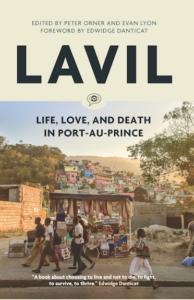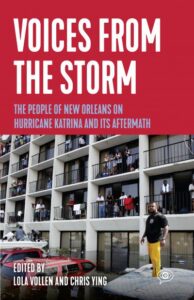The Voice of Witness book series amplifies the stories of people directly impacted by—and fighting against—injustice. We use an oral history methodology that combines ethics-driven practices, journalistic integrity, and an engaging, literary approach.
The books explore issues of inequity and human rights through the lens of personal narrative. Each project aims to disrupt harmful narratives by supporting historically marginalized or silenced communities to tell their own stories in their own words.
Book clubs are useful tools for engaging and interacting with these oral histories and the issues they highlight. Find our handout with guidance on planning and facilitating one here.
Use the questions below to start a book club for Mi María: Surviving the Storm | Voices from Puerto Rico.

Discussion Questions:
- In the introduction to Mi María, co-editor Ricia Anne Chansky says, “What is named ‘resilience’ is in actuality what occurs when a people are taught not to expect equitable treatment from their own government, developing a necessary understanding that they must be self-reliant in order to survive.” How does this theme resonate throughout the book?
- Many of the narrators in Mi María express that the hurricane exacerbated problems related to Puerto Rico’s colonial history. How did issues related to colonialism impact the US government’s response to Hurricane María?
- Narrator Belle Marie Torres Veláquez mentions that “Life in Culebra is not for everyone.” What is she implying about this island-municipality and the people who live there? What does it say about the Puerto Rican archipelago generally, and the isolated and dependent experience of living on an island?
- Many of the narrators in Mi María discuss how their relationships with family (bio-legal or chosen) play a significant role in their daily lives. How did these relationships influence their responses to the disaster and its aftermath, both for families on the Puerto Rican archipelago and the mainland US?
- Narrator Carlos Figeroa Vázquez talks about the working conditions he experiences as an Electric Lineworker before and after the hurricane. His story highlights the tension between frontline workers and the Puerto Rican power company, PREPA. What impact will the recent privatization of Puerto Rico’s power grid have on Carlos and other workers like him?
- Narrator Zaira R. Arvelo Alicea talks about the young girls from a caserío (public housing project) that weren’t taken seriously by the authorities when they insisted that Zaira and her partner Juan Carlos were trapped and needed help. How does this story illuminate the opportunities and challenges of how communities respond to natural disasters?
- Narrator Windy Diáz Diáz says, “I felt forgotten. I was forgotten.” What were the major factors that contributed to Windy’s isolation and how did she respond to them?
- What are examples of cultural capital, strength, and familial/community support that you see amongst the narrators in Mi María?
- Based on reading the first-person narratives in the book, how would you describe the relationship between the US Government and Puerto Rico? Do the citizens of Puerto Rico enjoy the benefits and privileges of “statehood,” are they treated as second-class citizens, or are they something in between?
- What were your perspectives about Puerto Rico before reading Mi María? After reading the narratives, have your perspectives changed? If so, how does the oral history format in particular influence your changing perspectives?



